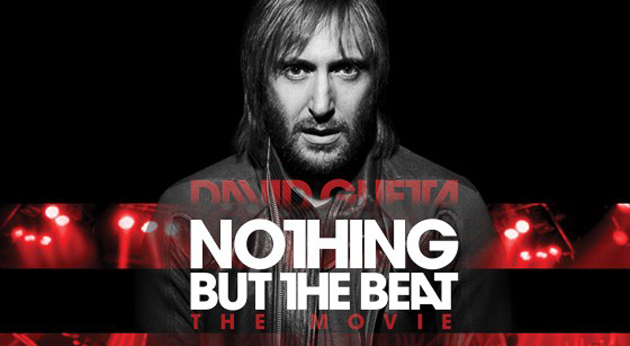Although his efforts to push mainstream visibility of electronic music are undeniable, David Guetta is a polarizing figure. To some, he embodies everything wrong with a crossover genre, sycophantic, shape-shifting, and dwarfing his art form for record sales. To others, Guetta’s the harbinger of recognition for dance music, which has long been dismissed as vapid club beats associated with drug use.
The Huse Monfaradi-directed documentary Nothing But The Beat – also the title of Guetta’s latest hit album but not a making-of retrospective – details the French producer’s career and rise and slightly humanizes him. As much as he’s credited to dance music’s recent popularity (and the hate-it-or-love-it Black Eyed Peas’ hit “I Gotta Feeling”), Nothing depicts Guetta as a DJ and producer like any other, someone who paid his dues in the clubs, worked his way up, and happened to be in the right place at the right time.
Within its slightly-over-an-hour timeframe, Nothing touches on three aspects of Guetta: touring, making music, and the trajectory of his career. At the start, he’s in Glasgow on his first major U.K. trek, goes to New York and Ibiza, and passes through Tomorrowland and Electric Daisy Carnival festivals. At several points, he’s in the studio with other artists or behind his laptop (as a spoiler, he has a habit of tentatively naming tracks after the location he’s recording or playing them in). And, we learn of his background, of taking an interest in DJing at 14, working in and listening to the music of gay clubs in the days of acid house, and his ascent, including his annual F—k Me I’m Famous parties in Ibiza, to one of the top DJs and most sought-after producers in the world.
Just like on Guetta’s albums, a handful of other artists are part of Nothing. Some, such as Snoop Dogg, Ludacris, Taio Cruz, and Avicii, are only on camera for a few minutes, offering nothing beyond praise for the French DJ. Others – particularly regular collaborators or associates like Afrojack, Will.i.am, and Chris Willis – provide a bit more substance: Afrojack discusses the impact of Guetta on his career, while Will.i.am describes the telephone call that essentially turned Guetta into a U.S. household name.
Getting behind a Peas’ single appears to be the turning point for his career, but while it is, Guetta admits to mixing house and hip-hop since his early days as a club DJ, and this is where the documentary omits a fair chunk of Guetta’s background. To U.S. audiences, and perhaps this is for whom the documentary is intended, Guetta’s the producer behind “I Gotta Feeling” and has put out two solo albums, Nothing But The Beat and 2009’s One Love. The period in his career from the late ‘80s to his F—k Me I’m Famous parties in 2000 is glossed over, however. Even before collaborating with Kelly Rowland on “When Love Takes Over,” this French producer had three studio albums to his name and, in fact, had been putting out singles since the early 1990s.
So, considering the documentary will no longer be free from iTunes after April 2, should you seek out Nothing But The Beat? If you’re not a Guetta fan, Nothing may change your perspective on “that guy who worked with the Black Eyed Peas” for the better. Guetta fans, on the other hand, may find Nothing only touches the surface of the French DJ’s two decade-plus career.




